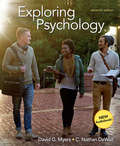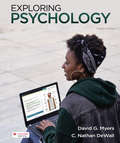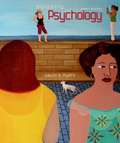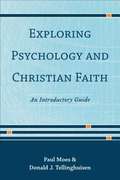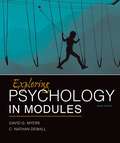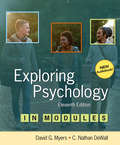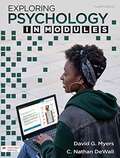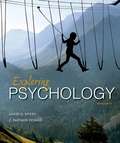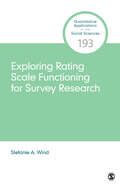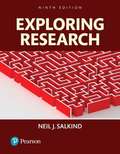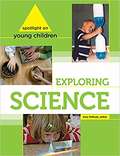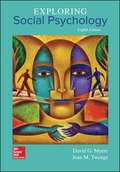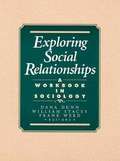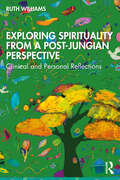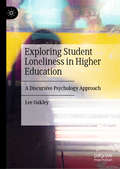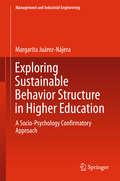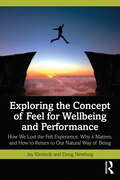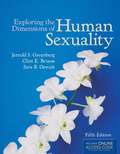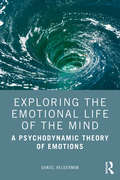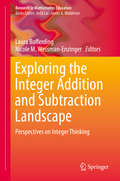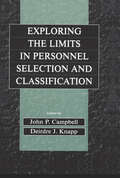- Table View
- List View
Exploring Psychology
by David Myers C. DeWallDo you want your students to engage with and retain psychology’s key principles, and to work toward becoming better students and better people in the process? Best-selling Exploring Psychology offers creative ways to help make it happen. <p><p> The new edition of Exploring Psychology offers outstanding currency on the research, practice, and teaching of psychology. Myers and DeWall inspire students with fascinating findings and applications, effective new study tools and technologies, and a compassionate and compelling storytelling voice. Their presentation is based on the same guiding principles that made David Myers the world’s bestselling introductory psychology author. <p> Facilitate learning by teaching critical thinking and helping students at every step. <p> Present psychology as a science, emphasizing the process of inquiry and putting facts in the service of concepts. <p> Make sure students come away with an appreciation of psychology's big ideas, and with a deeper respect for humanity--what drives us, distinguishes us, unifies us.
Exploring Psychology
by David G. Myers C. Nathan DeWallIn this brief text, Myers and DeWall help you look at the world from the perspective of a psychological scientist, relating psychology ideas and applications to your own thoughts, feelings, and behavior.
Exploring Psychology (6th Edition)
by David G. MyersPreface -- Thinking critically with psychological science -- Neuroscience and behavior -- The nature and nurture of behavior -- The developing person -- Sensation and perception -- States of consciousness -- Learning -- Memory -- Thinking, language, and intelligence -- Motivation -- Emotions, stress, and health -- Personality -- Psychological disorders -- Therapy -- Social psychology
Exploring Psychology (8th edition)
by David G. MyersFar and away the bestselling brief introduction to psychology, David Myers' Exploring Psychology doesn't just present the story of the psychology. It involves students deeply in that story, as they learning to think critically about psychology's core ideas, breakthrough research findings, and wide-ranging applications to their lives and the world around them. The new Eighth Edition is both classic Myers and cutting-edge psychological science, a rich presentation more than ever before, helps students develop the critical thinking skills they need to make their encounters with psychological science successful and personally enriching. The most extensively revision to date, the Eighth Edition features many hundreds of new research citations, over 40% new photos, and state-of-the-art media and supplements--plus an all new critical thinking feature, Test for Success: Critical Thinking Exercises. Still, with the book's continual evolution, one constant remains: the inimitable writing of David Myers, who continues to show an uncanny ability to engage the curiosities of all kinds of students as they explore both the scientific and human aspects of the field of psychology.
Exploring Psychology and the Christian Faith: An Introductory Guide
by Paul Moes Donald J. TellinghuisenThis introductory guide provides a coherent framework for considering psychology from a Christian perspective.
Exploring Psychology In Modules
by David Myers C. DeWallThe new edition of Exploring Psychology in Modules offers outstanding currency on the research, practice, and teaching of psychology. Myers and DeWall inspire students with fascinating findings and applications, effective new study tools and technologies, and a compassionate and compelling storytelling voice.
Exploring Psychology in Modules
by David Myers C. DeWallAre you taking a psychology course, interested in self-study, or just plain curious about all things psychology? The best-selling Exploring Psychology text, newly available in this audiobook form and with an accompanying PDF of illustrations, teaches the concepts in an engaging, creative, effective way and helps us become better students and better people in the process. Exploring Psychology offers outstanding currency on the research, practice, and teaching of psychology. David Myers (Hope College) and Nathan DeWall (University of Kentucky) inspire their listeners with fascinating findings and applications and a compassionate and compelling storytelling voice that carries through beautifully in this audiobook's professional narration. Their presentation is based on the same guiding principles that have made David Myers the world's best-selling introductory psychology author. Myers and DeWall teach critical thinking and encourage active learning at every step; present psychology as a science, emphasizing the process of inquiry and putting facts in the service of concepts; and make sure their listeners come away with an appreciation of psychology's big ideas, and with a deeper respect for humanity - what drives us, distinguishes us, and unifies us.
Exploring Psychology in Modules
by David G. Myers C. Nathan DeWallDo you want your students to engage with and retain psychology’s key principles, and to work toward becoming better students and better people in the process? The modular version of Exploring Psychology offers creative ways to help make it happen. The new edition of Exploring Psychology in Modules offers outstanding currency on the research, practice, and teaching of psychology. Myers and DeWall inspire students with fascinating findings and applications, effective new study tools and technologies, and a compassionate and compelling storytelling voice.
Exploring Psychology in Modules
by David G. Myers C. Nathan DeWallExploring Psychology in Modules creatively helps students retain and appreciate psychology's big ideas, with insights that enable readers to be better students, more tuned-in friends and partners, more effective co-workers, and wiser parents. These best-selling authors aim to captivate students with what psychologists are learning about our human nature, to help them think more like psychological scientists, and to help them relate psychology to their own lives—their thoughts, feelings, and behaviors.
Exploring Psychology in Modules (Ninth Edition)
by David G. Myers C. Nathan DewallIn this ninth edition, the unwavering vision for Exploring Psychology is to merge rigorous science with a broad human perspective that engages both mind and heart.
Exploring Psychology, Tenth Edition
by David G. Myers C. Nathan DewallThe new edition of Exploring Psychology offers outstanding currency on the research, practice, and teaching of psychology. Myers and DeWall inspire students with fascinating findings and applications, effective new study tools and technologies, and a compassionate and compelling storytelling voice. Their presentation is based on the same guiding principles behind the entire family of textbooks that have made David Myers the world’s bestselling introductory psychology author: Facilitate learning by teaching critical thinking and helping students at every step. Present psychology as a science, emphasizing the process of inquiry and putting facts in the service of concepts. Make sure students come away with an appreciation of psychology’s big ideas, and with a deeper respect for humanity—what drives us, distinguishes us, unifies us. This Exploring Psychology is the first to include Myers’ handpicked co-author. Nathan DeWall shares Myers’ belief that instilling a sense of curiosity and inquiry about psychological science is an effective way to help students navigate the content, think critically, and prepare for a lifetime of learning and living. The extraordinary, longtime Myers ancillary author team is also here—a group whose teamwork, consistency, and commitment again sets the industry-standard for instructor and student supplements. The high quality that consistently sets Myers’ ancillaries apart sees a new incarnation in LaunchPad. This course space organizes all the book’s digital resources in an online format that makes it easier for instructors to teach, track, and assess their students
Exploring Rating Scale Functioning for Survey Research (Quantitative Applications in the Social Sciences)
by Stefanie A. WindItems with ordered response categories are common in survey research, such as when respondents are asked how much they agree with certain statements. But how large are the differences between categories of response, and how well do they distinguish between respondents? This volume is the first to introduce the evaluation of rating scales to an audience of survey researchers. Evaluating Rating Scale Functioning for Survey Research provides researchers with an overview of rating scale analysis along with practical guidance on how to conduct such analyses with their own survey data. Author Stefanie A. Wind presents three categories of methods: Rasch models; non-Rasch Item Response Theory (IRT) models; and non-parametric models, together with practical examples. Tutorials, datasets, and software code (R and Facets) to accompany the book are available on the book’s website.
Exploring Rating Scale Functioning for Survey Research (Quantitative Applications in the Social Sciences)
by Stefanie A. WindItems with ordered response categories are common in survey research, such as when respondents are asked how much they agree with certain statements. But how large are the differences between categories of response, and how well do they distinguish between respondents? This volume is the first to introduce the evaluation of rating scales to an audience of survey researchers. Evaluating Rating Scale Functioning for Survey Research provides researchers with an overview of rating scale analysis along with practical guidance on how to conduct such analyses with their own survey data. Author Stefanie A. Wind presents three categories of methods: Rasch models; non-Rasch Item Response Theory (IRT) models; and non-parametric models, together with practical examples. Tutorials, datasets, and software code (R and Facets) to accompany the book are available on the book’s website.
Exploring Research: Ninth Edition
by Neil J. SalkindFor courses in Experimental Methods and in Research Methods in Political Science and Sociology <P><P>An informative and unintimidating look at the basics of research in the social and behavioral sciences <P><P>Exploring Research makes research methods accessible for students – describing how to collect and analyze data, and providing thorough instruction on how to prepare and write a research proposal and manuscript. Author Neil Salkind covers the research process, problem selection, sampling and generalizability, and the measurement process. He also incorporates the most common types of research models used in the social and behavioral sciences, including qualitative methods. The Ninth Edition explores the use of electronic sources (the Internet) as a means to enhance research skills, includes discussions about scientific methods, and places a strong emphasis on ethics. <P><P>NOTE: This ISBN is for a Pearson Books a la Carte edition: a convenient, three-hole-punched, loose-leaf text. In addition to the flexibility offered by this format, Books a la Carte editions offer students great value, as they cost significantly less than a bound textbook.
Exploring Science (Spotlight On Young Children)
by Amy Shillady National Association for the Education of Young Children StaffChildren’s early SCIENCE experiences, at school and at home, are the foundation for future science learning and comprehension―throughout the school years and life. This collection of articles from NAEYC’s journal Young Children showcases exciting ways to support children’s science explorations from infancy through age 8. The authors offer ideas for science-rich environments and hands-on activities that promote young learners’ investigations and discovery. The articles describe teaching approaches and child-initiated projects that introduce children to scientific and engineering practices, and concepts in the physical, life, and earth and space sciences and in engineering and technology.
Exploring Social Psychology (Eighth Edition)
by David G. Myers Jean M. TwengeExploring Social Psychology succinctly explores social psychological science and applies it to contemporary issues and everyday life. Based on the bestselling text, Social Psychology by David Myers and Jean Twenge, the book presents 31 short modules―each readable in a single sitting―that introduce students to such scientific explorations as love and hate, conformity and independence, prejudice and helping, and persuasion and self-determination.
Exploring Social Relationships
by Dana S. Dunn Frank Weed William A. StaceyThis unique workbook involves readers in "hands-on" practice with applying sociological concepts as tools for understanding the social world around them - both social institutions and social processes. A series of essays and accompanying exercises actively engages readers in the study of human situations and social behavior by having them collect familiar information and analyze it using the sociological perspective. The essays address contemporary social issues and problems, and span a range of topics.
Exploring Spirituality from a Post-Jungian Perspective: Clinical and Personal Reflections
by Ruth WilliamsDerived from Ruth Williams’ more than 40-year immersion in spiritual practice, as well as her clinical experience as a Jungian analyst, this thought-provoking volume explores the nature of spiritual paths and trajectories in practical ways, incorporating personal anecdote and ground-breaking academic research and providing a window into how Jungian practitioners work with soul and spirit. Williams explores the nature of being a human using the Yiddish idea of a person being a ‘mensch’, which means being a decent human being, having humanity and living ethically with integrity. The idea of ‘grace’ is the thread that runs through the book—the mystery that binds things together and makes life meaningful, purposeful, potentially joyful and spiritually fulfilling. Williams sees ‘grace’ as being that which underpins and lies behind synchronicity and divinatory practices and as a force by which we can learn to be guided. Rooted in clinical work, Exploring Spirituality from a Post-Jungian Perspective is fascinating reading for Jungian analysts, therapists and academics, as well as for general readers interested in a spiritual journey, both personally and for clinical purposes.
Exploring Student Loneliness in Higher Education: A Discursive Psychology Approach
by Lee OakleyThis book is an in-depth qualitative linguistic study of loneliness disclosures in interviews with undergraduate students in the UK. While much loneliness research has been undertaken in the areas of psychology, social policy and education, such studies have prioritised the social factors behind mental distress without paying explicit attention to the medium in which such distress is communicated and embodied (i.e. language). This monograph supplements this growing body of work by arguing for a stronger focus on the insights which linguistic analysis can provide for investigating how and why loneliness is disclosed by Higher Education students. This book is the first study to address discourses of loneliness in Higher Education specifically from a linguistic perspective, and will be of interest to education and healthcare professionals, counselling and welfare providers, and students and scholars of discourse analysis and linguistics.
Exploring Sustainable Behavior Structure in Higher Education
by Margarita Juárez-NájeraThis book presents a social-psychology model delineating the factors that may influence in an altruistic manner sustainable behaviour (SB) of students, faculty and administrators in four higher education institutions (HEI) with very different economic and social characteristics. It presents the areas where these individuals work (education and community management), and in which of them education for sustainability is promoted, focusing on four alternative methods of learning: play, art, group therapy, and personnel management. The book is intended for bachelors and graduated students, as well as researchers in social psychology, environmental psychology, conservation psychology, environmental education, education for sustainable development, cross-cultural psychology, and social sciences.
Exploring the Concept of Feel for Wellbeing and Performance: How We Lost the Felt Experience, Why it Matters, and How to Return to Our Natural Way of Being
by Jay Kimiecik Doug NewburgThis book analyses and unpacks the term Feel by exploring its many definitions and examples in real life. Incorporating psychological theories and case studies, it offers a groundbreaking look into what it means to Feel and its importance in people’s everyday lives. Experiencing life without Feel has led to many deleterious performance, health, and wellbeing consequences. Exploring the Concept of Feel for Wellbeing and Performance takes a deep dive into the origins and definitions of Feel, asking what has happened to the Feel experience, and what people must do to recoup their Feel. With a highly accessible tone and clear structure, the book provides its readers with effective ways to improve performance and enhance wellbeing. The authors challenge the status quo of both performance science and wellbeing practices and begin a conversation on why people should be more proactive when it comes to their Feel. Anyone interested in helping themselves or others with performance excellence and wellbeing will benefit from this book, which blends science and practice and provides many examples of people from all walks of life who live with Feel. The book will also be key reading for students and practitioners interested in sport psychology, leadership studies, mental health studies counselling, and life coaching.
Exploring the Dimensions of Human Sexuality Fifth Edition
by Jerrold S. Greenberg Clint E. Bruess Sara B. OswaltRevised and updated with the latest statistics and recent developments, the fifth edition of Exploring the Dimensions of Human Sexuality addresses the many facets of sexuality, covering the biological, spiritual, psychological, and sociocultural dimensions.
Exploring the Emotional Life of the Mind: A Psychodynamic Theory of Emotions
by Daniël HeldermanThis highly innovative new book reconsiders the structure of basic emotions, the self and the mind. It clinically covers mental disorders, therapeutic interventions, defense mechanisms, consciousness and personality and results in a comprehensive discussion of human responses to the environmental crisis. For openers, a novel psychodynamic model of happiness, sadness, fear and anger is presented that captures their object relational features. It offers a look through the eyes of these specific emotions and delineates how they influence the interaction with other persons. As regulation of the emotional state is the core task of the self, dysregulation can lead to mental disorders. Clinical cases of post-traumatic stress disorder, obsessive compulsive disorder and depression are discussed, using the model to outline the emotional turbulence underneath. Finally, the elaborated theory is used to analyse personal responses to the environmental crisis and political strategies that capitalise on them. This book will appeal to scholars, psychotherapists and psychiatrists with an interest in emotions and who wish to challenge their own implicit theory of emotion with an explicit new model. It will also be of interest for academic researchers and professionals in fields where emotional processes play a pivotal role.
Exploring the Integer Addition and Subtraction Landscape: Perspectives on Integer Thinking (Research in Mathematics Education)
by Laura Bofferding Nicole M. Wessman-EnzingerOver the past few decades there has been increased interest in how students and teachers think and learn about negative numbers from a variety of perspectives. In particular, there has been debate about when integers should be taught and how to teach them to best support students’ learning. This book brings together recent work from researchers to illuminate the state of our understanding about issues related to integer addition and subtraction with a goal of highlighting how the variety of perspectives support each other or contribute to the field in unique ways. In particular, this book focuses on three main areas of integer work: students’ thinking, models and metaphors, and teachers’ thinking. Each chapter highlights a theoretically guided study centered on integer addition and subtraction. Internationally known scholars help connect the perspectives and offer additional insights through section commentaries. This book is an invaluable resource to those who are interested in mathematics education and numerical thinking.
Exploring the Limits in Personnel Selection and Classification
by John P.Campbell and Deirdre J.KnappBeginning in the early 1980s and continuing through the middle 1990s, the U.S. Army Research Institute for the Behavioral and Social Sciences (ARI) sponsored a comprehensive research and development program to evaluate and enhance the Army's personnel selection and classification procedures. This was a set of interrelated efforts, collectively known as Project A. Project A had a number of basic and applied research objectives pertaining to selection and classification decision making. It focused on the entire selection and classification system for Army enlisted personnel and addressed research questions that can be generalized to other personnel systems. It involved the development and evaluation of a comprehensive array of predictor and criterion measures using samples of tens of thousands of individuals in a broad range of jobs. The research included a longitudinal sample--from which data were collected at organizational entry--following training, after 1-2 years on the job and after 3-4 years on the job. This book provides a concise and readable description of the entire Project A research program. The editors share the problems, strategies, experiences, findings, lessons learned, and some of the excitement that resulted from conducting the type of project that comes along once in a lifetime for an industrial/organizational psychologist. This book is of interest to industrial/organizational psychologists, including experienced researchers, consultants, graduate students, and anyone interested in personnel selection and classification research.
